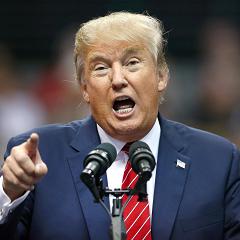
TRUMP: Is This The Change That Was Wanted?
With Trump's hiring and pay freeze, his first action as President, the 31% of the federal workforce made up of veterans will be particularly hard hit. Moreover, Trump's order also hurts unemployed veterans already in the pipeline for job openings in the federal workforce, ones who would have had a great shot at getting new federal jobs, thanks to President Obama's Veterans Employment Initiative.
The freeze could make this preference for veterans in applying for jobs meaningless. "There's no preference, if there's no job," said Lawrence Korb, an assistant secretary of defense for personnel in Reagan’s administration. And, while the hiring freeze exempts military personnel, it will likely be harmful to them by curtailing the hiring of DoD [Department of Defense] civilians who provide vital support to troops and families.
And, “an Air Force wife who contacted Military.com said she had a Federal job at her husband's base but had to give it up when the family recently moved to a new base. She said that she was placed on a Priority Placement Program for a similar federal job at the new base but has now been told she won't be hired because of the freeze.”
Joe Davis, spokesman for the 1.7 million member VFW [Veterans of Foreign Wars], noted that Trump repeatedly pledged during the campaign to overhaul the Veterans Affairs Department to eliminate wait times and improve care for veterans. To do that, "obviously, you need personnel," Davis said. But the hiring freeze applies to the VA, which had been seeking to bring on 2,000 new employees to help clear up appointment backlogs and improve care. [Military.com 1/24/17]
Though Trump bragged he was going to take care of veterans, his action hurts them more than perhaps any other group.
Moreover, the claimed rationale that there’s been a "dramatic expansion of the federal workforce" is flat out wrong--for executive branch federal government employment (not including uniformed military personnel) has dropped since the high point in the late 1980s and early 1990s, when it averaged about 3 million employees, to 2.66 in 2014. [OPM.gov]
Then, to supposedly make Mexico pay for a border wall, there was the administration proposal to levy a 20% tax on imports from that country. We all now know who would actually be paying the cost for that scheme.
Then there was the harmful impact of Trump’s travel ban, such as with the Syrian family that spent years working out legal entry to the U.S. and was sent back to war-torn Syria landing at a Philadelphia airport (seeking to re-unite with close relatives, U.S. citizens), just hours after Trump had issued his order denying Syrian refugees entry to this country. Potential Muslim extremists/terrorists? Hardly—Orthodox Christians! [CNN, 1/29/17]
And there’s the case of an Iranian couple, whose relatives are U.S. citizens, traveling to this country with their baby in urgent need of heart surgery, that was turned back. Fortunately, with great effort on the part of many parties (and a court order issuing a restraining order on the travel ban), the family arrived in the U.S. in time for the life-saving surgery. [The Guardian, 2/8/17]
Imposing quick, simplistic actions (be they radical or reactionary) in the face of complicated situations is bound to bring unintended and damaging consequences. Is this the kind of change we should have to endure?
Douglas Paprocki
